End of Reconstruction / Populism
1/24
Earn XP
Description and Tags
Flashcards of key vocabulary and concepts from the End of Reconstruction and Populism.
Name | Mastery | Learn | Test | Matching | Spaced | Call with Kai |
|---|
No study sessions yet.
25 Terms
Panic of 1873
Due to the rising amount of economic opportunities that arose at the time, many people like Carpetbaggers and Scalawags were interested in creating businesses and industries in the new South. Therefore, they took out big loans that they weren’t able to pay back, causing the Panic of 1873. This led to the end of Reconstruction as people stopped caring about equality and instead focused on being able to feed themselves. Additionally, it also led to the rise of bimetallism, which would cause more money to be in circulation and decrease the value of the dollar, meaning that debts would be worth less.
Compromise of 1877
In the election of 1876 which involved Samuel Tilden and Rutherford B Hayes, Tilden won the popular vote but Rutherford B Hayes had more electoral votes. There were 20 undecided votes. The republicans controlled the senate while the democrats controlled the House of Representatives. Democrats were willing to elect Rutherford in exchange for something else, which were 3 things. First, the withdrawal of federal troops from Louisiana and South Carolina. Second, federal money to build railroads from Texas to the west. Third, the Democrats wanted a conservative southerner in the cabinet.
Samuel Tilden
Democratic candidate who won the popular vote in the 1876 election but lost the presidency due to the Compromise of 1877.
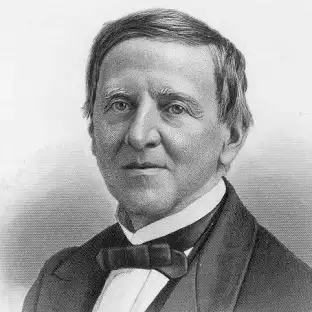
Rutherford B. Hayes
Republican candidate who won the 1876 election through the Compromise of 1877; also sent federal troops to suppress the Great Railroad Strike of 1877.
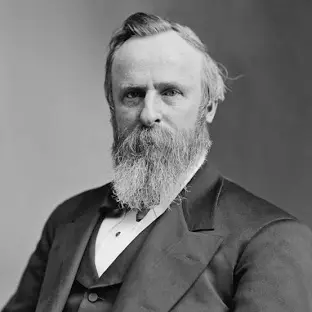
Home Rule
The ability to run state governments without federal intervention, leading to restrictions of African American rights and dismantled public schools in the South.
Ulysses S. Grant
18th president of the US who was naive to corruption in his administration.
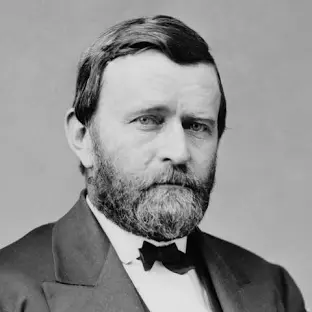
Whiskey Ring
Scandal during Grant's administration involving over 200 officials taking bribes to help whiskey distillers avoid paying taxes.
Credit Mobilier
Political scandal during Grant's administration where a railroad company skimmed profits from government contracts.
Morrill Land Grant Act
Federal act that supported farmers by providing states with land grants to promote agricultural education and production.
Dawes Act
Act aimed at assimilating Native Americans by breaking up reservation lands and distributing them to individual natives. image is henry dawes
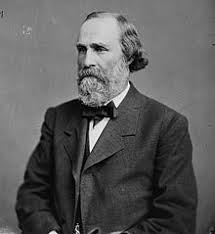
Bonanza Farm
Large farms created by railroad companies that often fell into bankruptcy due to droughts and lack of crop flexibility.
The Grange (Grangers)
Organization founded in 1867 to address the economic struggles of farmers, particularly those related to railroad practices and storage fees. Founded by Oliver Hudson Kelley
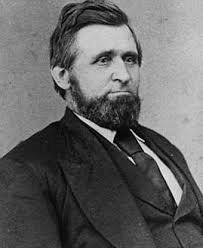
Bimetallism
Concept of using both gold and silver as the standard for currency, intended to increase the money supply and lower the value of the dollar.
William Jennings Bryan
Three-time Democratic presidential nominee and was never elected president. he was an advocate for the free silver movement, known for his 'Cross of Gold' speech. He was a democrat but closely aligned with the populist party.
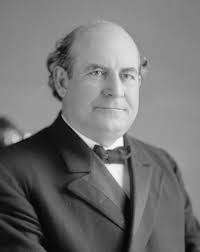
"Cross of Gold" speech
Speech by William Jennings Bryan advocating for bimetallism and criticizing the gold standard's impact on farmers and laborers.
Populists
Political movement that fought for reforms to support the people such as a graduated income tax, increased money supply, federal loan program, direct election of senators, 8-hour workday, immigration restrictions and single terms for President and Vice President.
General Custer & Battle of Little Big Horn
Conflict where General Custer attempted to trespass on native territory, resulting in the death of all his troops at the hands of natives. Represented the larger struggle between white settlers and natives.
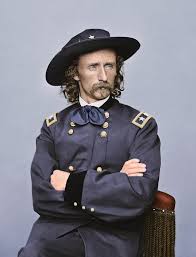
Wounded Knee
Massacre where Custer's old regiment killed 300 Sioux, fueled by white settlers' fear of the Ghost Dance movement.
Election of 1888
Harrison (R) defeats Cleveland (D)in a controversial election, marked by high voter turnout and debates over tariffs.
Election of 1892
Cleveland (D) defeats Harrison (R)
Election of 1896
McKinley vs Bryan – McKinley wins (but just barely)
Election of 1884
Cleveland (D) defeats Blaine (R)
Gold Bugs vs. Silverites
Gold bugs - Bankers and businessmen who wanted gold standard and less money in circulation because loans would be repaid in stable money. Effects include deflation (prices fall, value of money increases, fewer people have money)
Sivlerites - farmers and laborers who wanted bimetallism which meant more money in circulation and that products would be sold at higher prices. Effects include inflation (prices rise, value of money decreases, more people have money).
William Mckinley
Supported Gold standard and wa sa republican who won against Bryan in the election of 1896, promoting business interests and higher tariffs.
Election of 1880
Garfield (R) defeats Hancock (D)